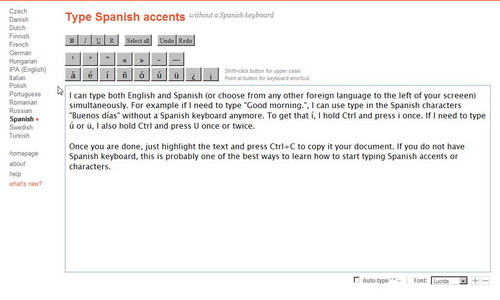One of the most popular online editor for typing foreign characters and IPA symbols, called TypeIt version 2.0 is now available for use free online.
The most joyful part is it has full keyboard support for “full keyboard support for Internet Explorer 6/7/8, Firefox, Safari and Google Chrome. You can switch between languages while typing; choose boldface, italics and underlines in all editors; choose the font face and size that looks good to you; and easily type professional-looking “curly” quotes, apostrophes ? and nice long dashes.” Source: Typeit homepage.
There are two reasons you will find this a useful tool:
Learning a new language really means you are transforming yourself from being monolingual to bilingual; you have to work with two languages in your head at all times. You use your preferred language as the base to help you as you undergo the mental aerobics of learning. When we start seeing yourself writing in two languages simultaneously, you do feel a sense of accomplishment, that you are moving forward
The other reason that this a great tool for learning a new language is that it allows you, the reader to make visual the text you have been learning by audio. I can confidently say it works because when we start to write, we exercise our muscular memory. The brain is taught to store these images.



As a schoolboy learning spanish, I remember thinking that upside down questionmarks were pretty cool…
I also think (as a native english speaker) that because we don’t tend to use accents on letters (save for a few words that we borrowed from french) that we generally under estimate the importance they have for other languages both generally and when we are trying to learn (not that I have ever tried very hard….)
What are your views on learning to write/type english versus learning to speak english?
Speaking and writing English (or other languages) are two different methods of learning the same thing. Both use muscular and sensory movements to help create routine patterns of learning which we store in our memory.
(The Discovery Of The Child, Maria Montessori). Speaking, however, depends on sensory perception of sounds and it takes precedence over writing. Our mind must first form an image or impressions about things we hear, see, smell or feel. The decision to write is not something we create but an action that is to come. We cannot teach writing but we can teach the written language. When the written language is not taught, the person expresses himself in the form of drawing or art (like how the cavemen did).
We will always find people who prefer only to learn how to speak English. For them , the written language is not an aid, so why learn them? We can take the example from the saleman, whose job is to bring in sales to earn his commission. He really does not need to understand any Japanese to sell a camera made in Japan to an English tourist. He needs to speak English.
Learning to write is an academic undertaking; it is not a social past-time. If I do learn to write, even if it is an Arabic phrase or a Mandarin short poem, I have to focus and concentrate on the structure, flow and formation of the strokes. Learning to speak can be taught as a social subject; it can be fun and formal. There are more business and jobs created from learning to speak than from learning to write: Speech and Drama, Learn To Speak American English, Learn To Speak British English, Speak Like An Australian, Toastmasters Club, Singing Competitions, Accent Reduction Professions, Wedding Singers, Public Speaking etc. People accept their shortcomings readily when they cannot speak English properly. However, when it comes to correcting their written language, you can be certain they will take it more seriously.